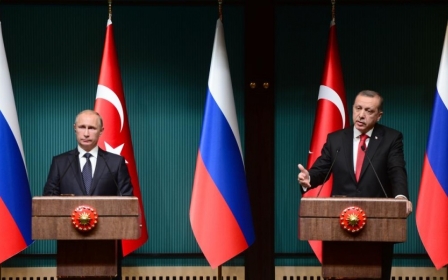Russia-Turkey pipeline to empower Ankara: experts

Russian President Vladimir Putin’s plan to provide an alternative to the South Stream gas pipeline will increase Turkey's bargaining chips, experts say.
Putin announced the cancellation of the original South Stream natural gas project through Bulgaria and declared the redirection through Turkey during his visit to Ankara on Monday.
The project plans to provide natural gas to Balkan countries, but it did not get an approval from the EU. The project’s original planned route was over Ukraine's offshore territory, which was rejected by the Ukrainian government.
Stephen Fortescue, an Associate Professor at Sydney's University of New South Wales, said Putin scored a victory in getting the Turkish president provide an alternative to the South Stream pipeline, which the EU opposed.
Fortescue said Russia would give a six percent discount on natural gas sales to Turkey from January 2015.
"The idea of a new pipeline through Turkey will increase its bargaining position vis-a-vis Russia for further gas deals," he said.
The professor said Putin's actions would have been based on the belief that the West was weak. "But at the moment it looks as if he underestimated the West's strength or at least its determination. I don't think the deal with Turkey significantly shifts the balance," he added.
Sergey Glebov, Professor of International Relations at the Centre for International Studies in Ukraine’s Odessa Mechnikov National University, said Putin actually had to make a retreat and his very important South Stream was now a total failure because he could not convince the EU to support it.
Glebov said Putin was now looking for a substitute to turn his defeat into victory by launching a new pipeline to reach Europe without Ukraine’s help.
"A lot will depend on the position of Turkey and Greece since both, the Trans-Anatolian Pipeline Project that will carry Azerbaijani gas to Europe via Turkey and the Trans Adriatic Pipeline, are also in their hands," he said.
When completed, the Trans-Anatolian Pipeline Project will carry around 16 billion cubic meters of gas per year to Europe via the Trans Adriatic Pipeline.
About whether the EU would buy Russian gas via the new pipeline and if Ukraine would feel the pinch, Glebov said, "If the new pipeline will be profitable for the EU politically, geopolitically and economically, the EU will let Ukraine down.”
But, he said that such a scenario was unlikely because the new pipeline would not be able to compete with the Trans-Anatolian Pipeline Project and Trans Adriatic Pipeline.
The new natural gas pipeline between Turkey and Russia could pass through Turkey's Thrace region, Turkish Energy Minister Taner Yildiz said Wednesday.
Thrace is a historical area in southeast Europe situated on the borders of Turkey, Greece and Bulgaria.
"Thrace will become a new hub for liquefied natural gas," Yildiz said during a presentation discussing Turkey's 2015-2019 Strategic Energy Efficiency Plan in Ankara.
He denied reports that the pipeline would pass through Samsun province and to the western regions of Turkey.
Opinions are divided over Putin's surprise announcement to abandon Moscow's $50 billion South Stream gas pipeline.
"The decision will allow Russia to walk away with its head held high," Alexei Gromov, an analyst at the Institute for Energy and Finance, told AFP.
Yet others interpreted the move as a rare sign of weakness and retreat by Kremlin leaders.
What some Russian media called Putin's "Turkish gambit" is according to other analysts just spin on Putin being forced to jettison one of his pet projects as Russia's economy creaks towards recession, struggles with the burden of Western sanctions, and watches both the rubble and oil prices tumble.
"Putin was purported to have another card up his sleeve," Steve LeVine wrote in Quartz, a US-based financial website, referring to Putin's new plan.
"But the announcement lacked the panache of its antecedents — the new pipeline had no name, no length, no price."
Analysts also warn Putin may not find life easier by replacing Europe with Turkey in the deal.
"Turkey can prove to be a more difficult partner than the EU," said Tatyana Stanovaya, a Paris-based analyst at Russia's Centre for Political Technologies, citing serious differences over Syria.
Stay informed with MEE's newsletters
Sign up to get the latest alerts, insights and analysis, starting with Turkey Unpacked
Middle East Eye delivers independent and unrivalled coverage and analysis of the Middle East, North Africa and beyond. To learn more about republishing this content and the associated fees, please fill out this form. More about MEE can be found here.




